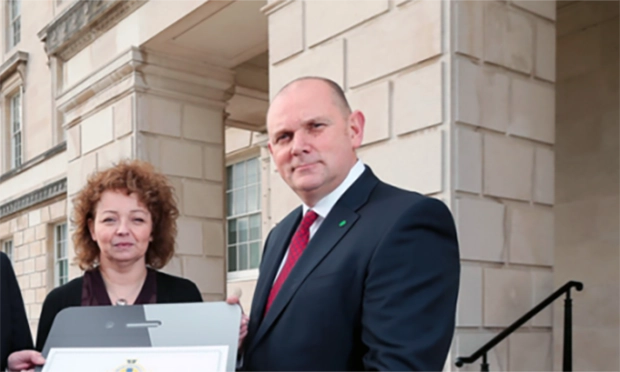Safeguarding expert warning over children in unregistered Hackney ‘schools’

Jim Gamble: ‘We are left managing a problem that is shameful. The gift to manage it is outside of local government’
A safeguarding expert spoke of his concerns that education bosses do not know where 1,000 Hackney children are getting their education.
Hackney’s group director for children and education Jacquie Burke has written to the new secretary of state for education outlining her concerns over unregistered schools and other places offering unregulated education.
This follows the scrapping of the government’s 2022 Schools Bill which would have removed loopholes that allowed some places of study to avoid registering as a school even if children go there most of the week.
Unregistered educational settings in Hackney include unregistered schools and yeshivas, which offer full time faith-based education to boys over 12 from the Orthodox Charedi Jewish community.
They do not meet government definitions of a school, because the curriculum is considered “narrow” and so they are unregulated, with no minimum standards the government tells them to follow in education or safeguarding.
Education bosses do not know how many children in Hackney attend unregistered schools. In January 2022 they knew about 609 pupils and by December they said they were aware of 1,087 children and young people attending unregistered places to study.
Town hall bosses are concerned because children studying at the orthodox Jewish yeshivas are “outside the line of sight of safeguarding professionals.”
The council cannot check that the buildings they study in are safe or appropriate and that safeguarding checks such as DBS (Disclosure and Barring Service) are carried out when people are recruited to work with children.
There is no suggestion of any specific concerns.
Children’s safeguarding commissioner Jim Gamble told the council’s children and young people scrutiny commission : “We are left managing a problem that is shameful. The gift to manage it is outside of local government.”
He said the government needs to take action.
“We do not have authority to deal with it and the influence that we have is fundamentally undermined by the whack-a-mole approach that goes on year-in, year-out.
“We cannot say at this moment in time where all the Yeshivas in our area of responsibility are as we just don’t know. It goes beyond any curriculum issue. This is the biggest risk that we face, the children because they are absolutely absent from our line of sight.”
He warned: “It will only be addressed tragically in the aftermath of something going horribly wrong and that can’t be allowed to continue year on year.”
“We simply can’t continue to nod and worry and wonder, well, maybe we’ll get something done down the line.”
Mr Gamble added: “The day that we face significant evidence of abuse being disclosed, or death or significant injury, is the day before this will be addressed by central government.
“We need to be that strident about it because otherwise we keep coming back and politely discussing it for fear of offending anyone.”
He said he was concerned about a series of risks, including fire breaking out from a place the authorities don’t know about, children with special needs “who are not being cared for in the way that they should be.
“We take the risk that something could happen in one of these venues because they’re no different than any other, that a person who is not properly trained and not properly vetted has got access to young people.”
Whilst Hackney Council has visited children’s homes to check on their welfare and find out what education they are getting, the council has no right to go to yeshivas to look at the quality of education on offer.
It means children are officially counted as missing from education, rather than getting home education.
Schools watchdog Ofsted is the only organisation which can visit the yeshivas, if it is investigating an unregistered school.
The council said it has worked with Orthodox Jewish groups to get assurances about safeguarding but they were not successful in “satisfactory engagement” with the study centres “to provide the necessary assurance we seek regarding safeguarding.”
Safeguarding training events were not attended.
The council said building links with community groups “remains the only way to secure consensual and lasting change” and build trust and confidence with parents and staff.
The Local Democracy Service approached the Union of Orthodox Hebrew Organisations and the Interlink Foundation who directed the service to Yeshiva Liaison for comment.
Whilst they did not comment the union has previously told an inquiry into safeguarding that “the intervention of the CHSCP as “well meaning” but said that the CHSCP (City and Hackney Safeguarding Children Partnership) does not understand the Charedi community and takes approaches that are impractical.”
It said the council’s anxiety that children are in its “line of sight” is seen as “arrogant, overbearing and intrusive by the community” and the education centres see the community as providing greater safeguards for their children than the state.
Their instinct is to “keep authorities at a distance, after centuries of persecution”.
There is also a concern that Ofsted has interfered in the Charedi community’s religious beliefs.
The union also pointed out that it supports safeguarding initiatives such as checks and awareness.
It said it prefers to use voluntary initiatives, using those within the community to provide training and advice.
